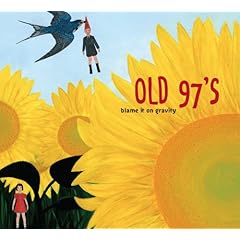
Artist-Old 97's
Album-Blame It on Gravity
Release Date-May 13, 2008
Genre/Style-Alternative Country-Rock
Official site-http://www.old97s.com/
Myspace-http://www.myspace.com/theold97s
Review-Rewind the clock to the early 1990s, when the Old 97's were not old in the least and their charismatic, pinup-worthy frontman — a struggling musician sharing an apartment with Clark Vogeler of the Toadies — had yet to reconcile his dueling adoration for pop music and vintage country songs. As the band rose to prominence, first in their native Dallas and then in alt country circles nationwide, they displayed a twangy vigor that fueled their early efforts. That vitality never quite left, but it became tempered over the years — tempered by the band's hasty exit from Elektra Records in 2001, by Rhett Miller's subsequent solo career, by the onset of fatherhood, by the steady encroachment of middle age. Cutting back to 2008, however, the Old 97's sound youthful and newly energized, having returned to Dallas and relocated that beloved crossroads between twangy country rock and tight, economic power pop. Blame It on Gravity is a homecoming of sorts, a revisit to the sonic sweet spot that made Too Far to Care the ideal pop album for people in cowboy boots, or the perfect country album for those who'd never heard of Lyle Lovett and Gram Parsons. The album's timing is impeccable, arriving during the same spring that saw the last published issue of No Depression (which, incidentally, featured a story on the band), and a nostalgic, souped-up re-release of Whiskeytown's Stranger's Almanac. Both are bittersweet reminders that alt country's golden days have faded into twilight, but the Old 97's remain stubbornly relevant, having weathered their audience's changing tastes and the record industry's changing priorities without losing a single member.
Rhett Miller is still the quartet's able-voiced frontman, his lyrics brimming with internal rhymes and character sketches. In the Spanish-tinged "Dance with Me" (a close cousin to Fight Songs' "What We Talk About"), he steps into the role of a foreign lover, enticing an American tourist to show him her night moves before jumping into the role of her cuckolded husband. Beneath him, guitars crunch and cymbals crash courtesy of his three bandmates: bassist Murry Hammond, the group's bespectacled elder statesman and a contributor to some of Gravity's finest cuts (including the Beatles-inspired "My Two Feet"); drummer Philip Peeples, who pummels the snare with a rhythmic, horse-hooved stomp, and lead guitarist Ken Bethea, a controlled flurry of guitar pedals, cowpunk riffs, and spiky facial hair. Together, the Old 97's pepper their seventh studio effort with their familiar mix of rock songs, mature ballads, and the shuffling midtempo numbers that fall somewhere between both camps. There's "She Loves the Sunset," a breezy gem combining a 1950s chord progression with tropical island flair, as well as the cozily atmospheric "Color of a Lonely Heart Is Blue," one of Murry Hammond's most moving and heartbreaking compositions to date. Such mellow tracks rub shoulders with the album's full-tilt rock numbers — "Ride," "Early Morning," "The One," "The Fool," — all of them delivered with the confidence of a band who's been there, done that, and stayed together while lesser groups split at the seams. No track quite approaches the breakneck pace of 1997's "Timebomb," but that's a minor quibble for a band who continues to remain earnest, fine-tuned, and wholly significant after 15 years of barroom rock & roll.
Product-buy it





No comments:
Post a Comment